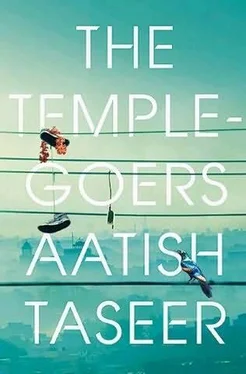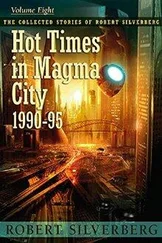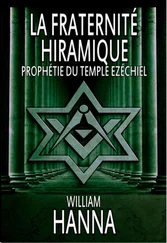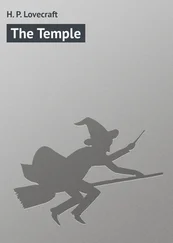‘They have made the BJP Chief Minister of Jhaatkebaal, Chamunda Devi, into the goddess Durga and are worshipping her in temples,’ Zafar sneered.
I laughed, and before I could check myself I’d said, ‘I know her. She’s Sanyogita’s aunt.’
Zafar looked sadly at me, as if I’d let him down by this admission of closeness to the Hindu nationalist party. Though it was well before the usual time, he asked that we take a cigarette break. I was suddenly aware of how frail he was. This awareness, alongside the fineness of his manners, the umbrella, the little cap, the pen always in place, the safari suit impeccable, made me feel that I hadn’t so much offended him as manhandled him.
On the balcony, he took out his blue packet of Wins and offered me one. From inside the packet came a black windproof lighter with a near-invisible flame. He liked to tell me that the cigarettes were Italian and had travelled via the east, Burma in particular, to India. But today he just smoked quietly, looking out at the large trees shielding us from the sun.
Long black pods hung like many walking sticks from the branches of a laburnum. On the edge of the canopy, yellow blossoms pushed reluctantly through like paint squeezed from a sponge. Their bright colour against the black of the pods and the dull green of the canopy made them seem of a different material from the rest of the tree, more like points of sunlight than flowers.
‘Amaltas,’ Zafar said, ‘the true beginning of the heat.’
And as if retreating from its glare, he put out his cigarette and went inside. I was studying his tufts of dyed black hair, dotted with maroon sores, when my eye trailed along his neck to a point between its base and the shoulder blade. There, off to the right, and seeming to catch a different light, was a small but distinct swelling. I reached forward and touched it. Zafar winced in pain. It was hard and knobby, somewhere between bone and cartilage.
‘What’s that?’
‘I’m becoming a camel,’ Zafar chuckled, his eyes betraying his fear.
‘This isn’t a joke. What is that? Have you shown it to a doctor?’
He took out a soiled and folded piece of paper from his pocket. It read:
Biopsy report: gross appearance, irregular greyish-white tissue along with dirty brown debris received, total measuring 1 x 1.5 cm
Histopathological report: microsection shows features of sebaceous cyst no e/o tb or malignancy seen
Diagnosis: sebaceous cyst
Dr Lipike Lipi, pathologist
‘They say it’s benign, but I’ll need an operation. I’ll have it while you’re away.’
‘Does it hurt?’
‘Only when touched. The problem is it makes my reading and writing work, which I do on the floor, quite difficult. You can say that it’s just part of old age.’
‘You’re not so old, Zafar. You’re younger than my mother.’
‘Yes, but life…’
‘… has made you old,’ I completed for him.
He laughed. Then as if wishing neither to alarm me nor to let me make light of what he had said, he added, ‘The place I live has made me old.’
The place he lived! How embarrassing that I hadn’t seen it. This attitude was a remnant of my childhood in Delhi, not so much a lack of curiosity as blindness. I resolved to go. Then a shudder went through me at the thought of this place that gave Zafar his sores, and now this new deformity. It was one other thing, like the heat, that he would bear while I was away.
The vehshat, the vehshat!
Sanyogita was part of a circle of creative-writing professionals called Emigrés at Home. Their weekly meeting coincided with our last night in Delhi. They met at a different group member’s house each week, and as Sanyogita had not offered hers so far, she decided to host this last meeting in the Jorbagh flat. Her friends Mandira and Ra were part of the group and so the meeting was also a farewell party of sorts. When I went to have a shower after my lesson with Zafar, Vatsala and Sanyogita were preparing the flat. Lamps were coming on; aubergine dips were being laid out; some light Brazilian music had begun to play. I knew that this kind of activity, reminiscent of her London life, meant a lot to Sanyogita. We had been through a difficult period that hadn’t been resolved as much as it had been presumed to end with our departure; I told myself in the shower that this would be the first active night of repair. It would start with my showing support for the creative writers. Her meetings with them were an assertion of her life in Delhi as separate from mine; but Sanyogita, who encouraged me in everything I did, would have liked nothing more than my endorsement for her ‘thing’.
When I came out of the shower the heat was breaking in a dust storm. It had stopped the day’s natural decline and cast a greenish-purple twilight hour over the city. After raging in the canopies of big Delhi trees, the storm entered the garden terrace, sweeping up fine dust off the floor, roughing up dahlias and denuding the dead frangipani of its last leaves.
In the lamp-lit room the meeting had begun. The people assembled were mostly older women in ethnic and tribal-print saris, with hair greying in buns for political reasons. There were also a handful of very tall, very thin young men with bad posture, as well as one or two older men in cotton kurtas and jeans. One dark, lightly bearded, young writer with sharp features sat at the feet of a woman with a red oversized bindi. She rested a wrist, heavy with silver bangles, on his shoulder as he stared morosely at the pages in his lap. His uncut toenails were visible in the blue rubber chappals he wore. The intensity of his stare, and a feeling that I knew him from somewhere, prevented me at first from listening to what the woman introducing him was saying.
In a far corner of the room, Sanyogita beamed at me, patting the empty space next to her. As I walked across the room, I heard the older woman, with her hand beating lightly against the young writer’s collarbone, say that he had attended a creative-writing programme in America; he was among the group’s most significant talents, best representing its theme, ‘Children of a post-colonial god: Indians feeling foreign in India’.
He was to read his story ‘The Assignation’.
The young man looked up at the room with dim, sad eyes. Prognathous, his smile, and later soft words, were almost lost in the cavity between his projecting lower jaw and face.
‘ “The Assignation”,’ he repeated in a south Delhi American accent.
‘Where’s your story?’ I whispered to Sanyogita.
‘I’m not reading today,’ she said, clutching my hand. ‘This is the last one.’
‘There’ve already been a few?’
‘Yes, a story and a poem. Now listen.’
Mandira and Ra, who were sitting next to each other, looked over. Mandira smiled; Ra clenched a fist into the air in a gesture of affection, then mouthed, ‘Pay attention to this. It’ll be really good. He’s a new voice out of Sectorpur.’
‘Has everyone read it already?’ I said to Sanyogita. ‘Shh, baby. No. Listen.’
The creative writer began: ‘Winter in Delhi. The street was enveloped in a stagy mist, harbouring pink bougainvillea. Men outside the teashop acted their parts, wrapping scarves around their faces and rubbing their hands. The hard-bellied owner, looking down at them over a roaring blue flame, handed out cups of tea as though moving chess pieces. An astrologically auspicious window to marry had opened and in many houses fairy lights hung from the trees, white shamianas sprang up and tinny music tore out of concealed speakers. I had lived unseasonably since my return, forgetting what the winter meant. But as the city awoke inevitably to the season, these reminders of my own long history there pierced the haze of the past several months.
Читать дальше












